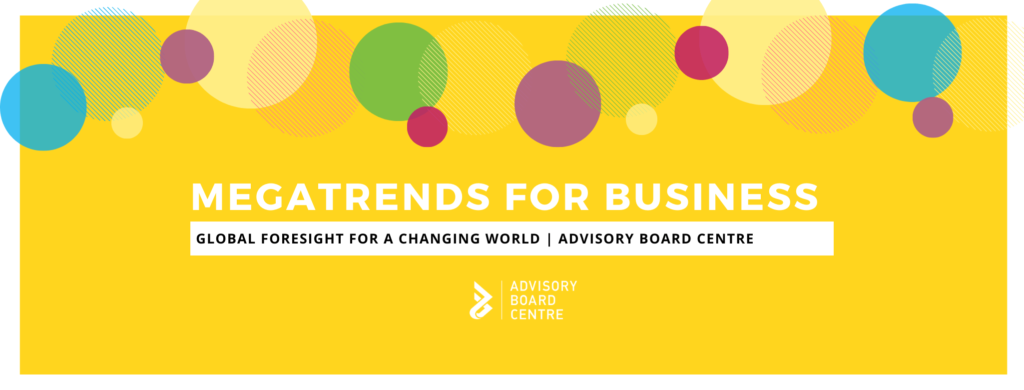
Megatrends 2025 – What’s driving strategic foresight in your organisation?
Latest News
Published 07 September 2020
One of the reasons Advisory Boards can be such an effective tool for organisations is their focus on the future.
Planning for the future (or possible futures) can be challenging for many organisations’ because, quite simply, no one has been there before.
High-quality Advisory Boards support organisations to be proactive and responsive to the future with a powerful combination of insight and foresight.
Insight : the capacity to gain an accurate and deep understanding of someone or something.
Foresight: the ability to predict what will happen or be needed in the future.
Advisory Board Chairs and Advisors use their skills, experience and deep intellectual curiosity to gain meaningful insights about the organisation’s operations today and strategic foresight to support the organisation to remain competitive, relevant and resilient for the future.
With so much focus on responding to the current operating environment, we must lift our eyes beyond the horizon and consider the issues that will be shaping the future of business.
These issues are called megatrends and represent an important shift in the progress of a society or of any other particular field or activity; any major movement.
This August, we gathered over 100 of the world’s leading Advisory professionals for the two-day Advisory Board Centre Megatrends Festival. The virtual meetings were an exploration of what will be shaping the future of business in the years to come to enable future-focused thinking and meaningful exploration of the possible strategic impacts for businesses.
But before we look to the future, let’s take a moment to reflect on the past.
Predictions for Business in 2020
In 2015, Inc.com interviewed business leaders to find out their predictions on how businesses must change to be competitive and relevant in 2020. 5 years ago, no one would have predicted how deeply COVID19 would be affecting businesses but if you look at what they did suggest you will find that organizations’ that heeded the megatrends predicted in 2015 would be much better placed to respond to the challenges and opportunities of 2020.
Globalisation
“To be ready for 2020, brands must commit to global; they must think and act in borderless ways.” Jason Hill
Mobile first
“I think the biggest change, and the one we’re already starting to see take shape, is that globally the majority of internet usage will be done via a mobile device and for most people the mobile web will be their primary–if not their only–way of experiencing the internet.” Peter Rojas, Co-founder of Engadget and Gizmodo
Powershift to consumers
“The balance of power is shifting toward consumers and away from companies… The right way to respond to this if you are a company is to put the vast majority of your energy, attention and dollars into building a great product or service and put a smaller amount into shouting about it, marketing it.” Jeff Bezos, Amazon.com founder.
Employess as humans first
“The way I think about culture is that modern humans have radically changed the way that they work and the way that they live. Companies need to change the way they manage and lead to match the way that modern humans actually work and live.” Brian Halligan
Sitting here in what was the future for 2015, it’s evident how on target these predictions were.
Another prediction, which still holds true today and well into the future, is legendary executive Jack Welch’s 2015 projection that an organisation’s “ability to learn, and translate that learning into action rapidly, is the ultimate competitive advantage.”
What are the learnings in 2020 that will shape the future of business?
Megatrends – 2025 and beyond
The Advisory Board Centre Megatrends Festival identified 4 key trends shaping the future of business. Each trend was explored in an intellectually stimulating keynote followed by practical review sessions to discover how to translate and prioritise these learnings into action.
New working order
How will security, loyalty and expectations of the role of work continue to evolve?
Market strategist and innovator Linda Ginger and Founder of BenchOn Tim Walmsley examined the changing nature of work and how this affects the traditional employee/ employer relationship as well as the flow-on effect this has on individuals choices about where and how they invest their time, skills and money.
Key Takeaway
Previously, employers had the power with employees doing what they could to be seen, hired, and put into the best career-making situations. COVID has highlighted a shift that has been growing and will be even more magnified in the future. Businesses have realised that their people drive revenue, culture, productivity. But what employees want, need and value from the business goes beyond just a paycheque.
Employers need to be supportive of their employees’ health, mental health, financial health and more. The better the employee’s situation, the better performing the employee which in turn makes for a more successful business. This also has greater economic and social impacts on society so businesses now need to be thinking wider than just revenue and bottom-line profit.
Collaborative business
How do we navigate business collaboration in a localized and global context?
Traditionally many organizations’ viewed collaboration as “what’s mine is mine and what’s yours is also mine” meaning collaboration must be better for one side. Future collaboration takes the view that “what’s ours is better”. The new view of collaboration was explored by Andrew Murray, Managing Director at Alpin and Craig Aldous, China specialist and former CEO of Woolworths Group China.
Key Takeaway
Uncertainty, which now binds all of us together in business, has long been the norm operating in China and other emerging economies globally. Andrew and Craig advocated that the businesses of the future will be those that are willing to evolve their business models to create collaborative models that act with speed and accommodate risk.
They will also be the organisations that recognise it is almost impossible to have internal mastery across all areas of your business and operating environment. The businesses of the future will invest in innovative and leadership capability to develop strong networks of diverse skills that enable rapid deployment of well-built strategies.
Social ethics
How will shifting social norms influence the dynamics of ethics in problem-solving for business and Advisors?
Against a backdrop of global political and social unrest, Social Ethics will increasing inform how businesses are created, operate and engage their employees, customers and stakeholders. Mark Veyret, Global Business Development Leader of entrepreneurial and private wealth clients at PWC, and Ram Castillo, advisor, author and host of Giant Thinkers podcast navigated the shift towards social ethics and how this informs businesses and consumers.
Social ethics for business considers and recognises the impact that the organisations decisions and activities have on society, its members and the environment; and behaves in a manner that positively contributes to the sustainable development, health, safety, welfare and harmony of society.
Key Takeaway
The rising focus on social ethics creates an opportunity for organisations to constructively challenge all areas of their operating environment and wider sphere of influence. Far beyond reacting to activism, embedding social ethics within the business models and decision-making frameworks will empower organisations and the diverse range of stakeholders they engage with. This creates not only a powerful brand advantage but a meaningful impact on society beyond traditional financial-only measures.
Personalised everything
How will the intersection of technology and relationship building reshape what we consume and how we consume it?
Technology and consumer demand are driving a move to tailored on demand food, fashion, beauty products and experiences. At the same time, individuals are increasingly concerned with privacy and use of their personal data. Renowned Food Futurist, Tony Hunter, and Rob Sherlock, global advertising Executive, set out how the complex and often competing priorities for consumers will create new business opportunities and ethical and legal challenges as they navigate the demand for personalisation.
Key Takeaway
Personalisation, like the other megatrends, cannot be viewed in a silo. Organisations will be well served to explore how they can utilise technology to create a more personalised experience without losing sight of the human experience. A truly personalised digital connection is created by people enabled by technology. Seek genuine opportunities to create personalised connections beyond gimmicks and never compromise on your brand trust in the process.
What’s Next?
Want to explore these megatrends further? Watch the Megatrends Festival Highlights session below.




